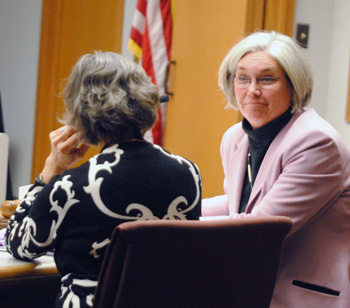Ann Arbor District Library board special meeting (Dec. 8, 2011): A 10-minute meeting wrapped up more than 18 months of negotiations, as the AADL board unanimously approved contracts with its two labor bargaining units.

Josie Parker, right, director of the Ann Arbor District Library, talks with AADL board chair Margaret Leary at the board's Dec. 8 special meeting. (Photo by the writer.)
The board had called a special meeting for Thursday to vote on these contracts, which run from Jan. 1, 2012 through June 30, 2015. The agreements are with the Ann Arbor District Library Staff Associates, which represents 30 employees, and the Ann Arbor District Librarians Association, which represents 14 AADL librarians. All but two of these 44 workers are full-time employees with benefits. The library employs a staff of nearly 200 at its five location throughout the district, including about 100 full-time workers.
The previous contracts expired on June 30, 2010. The main difference between the old and new contracts relates to a change in health insurance providers, plans and employee contributions, according to AADL director Josie Parker. She said she appreciated the hard work that both sides of the negotiations had done to reach an agreement.
The two AADL bargaining units are part of the Michigan Education Association, dating back to the years prior to 1996 when the library was still part of the Ann Arbor public schools system. Paul Morrison, executive director of the Ann Arbor Education Association – the local MEA unit – participated in negotiations and described the outcome as “not great for labor” but reasonable, given the economic circumstances.
The board took two other actions at its meeting on Thursday: (1) a vote to cancel its Dec. 15 meeting, because there are no pressing agenda items; and (2) a vote to call an executive session for its Jan. 16, 2012 meeting, to discuss the written opinion of its legal counsel. [Full Story]




